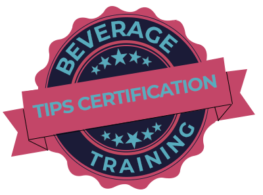In a world where the hospitality and beverage industry thrives on social gatherings and the responsible sale of alcoholic beverages, we cannot overstate the importance of ensuring the safe service and sale of alcohol. However, Delaware TIPS Certification, an acronym for “Training for Intervention Procedures,” stands as a beacon of responsible alcohol service in the First State. This comprehensive program not only equips alcohol servers and sellers with the necessary knowledge and skills to navigate the complex world of beverage service but also serves as a vital tool in promoting public safety and preventing the potential harms associated with alcohol consumption.
Delaware TIPS Certification Training Program
| Course Name | Hours | Price | Checkout |
|---|---|---|---|
| TIPS Delaware On-Premise Responsible Alcoholic Beverage Server Training + Food Handler | 5 | $42.99 | Enroll |
| TIPS Delaware On-Premise Responsible Alcoholic Beverage Server Training | 3 | $34.99 | Enroll |
| TIPS Off-Premise Alcohol Seller Training | 3 | $34.99 | Enroll |
| TIPS Off-Premise & Alcohol Delivery Training | 3 | $34.99 | Enroll |
| TIPS Concessions Alcohol Training | 3 | $34.99 | Enroll |
| TIPS Gaming Alcohol Training | 3 | $34.99 | Enroll |
| TIPS Replacement Card | $20.00 | Enroll |
Delaware TIPS Certification is a cornerstone in the state’s approach to addressing the challenges posed by the responsible service and sale of alcohol. This program goes beyond the basics of pouring drinks and takes a proactive approach to alcohol-related issues such as underage drinking, overconsumption, and intoxicated patrons. It arms individuals working in the alcohol industry with the skills to identify potential problems, defuse tense situations, and ensure the well-being of both customers and the community.
Is Alcohol Server Training | TIPS Certification Mandatory in the State of Delaware?
According to Delaware’s Alcohol and Tobacco Enforcement, those who serve or sell alcohol must complete a Responsible Server Training course approved by the state.In other words, if you want to bartend in the state of Delaware, you must legally complete a state-approved server training program successfully.
We’ll equip you with the knowledge and skills to ensure that alcohol is served safely and responsibly. Whether you’re a experienced employee or new to the industry, our goal is to help you create a safe and enjoyable environment for your customers. Delaware prioritizes responsible alcohol service, and by the end of this training, you will be better prepared to actively contribute to keeping our communities safe and promoting responsible drinking.
What We Aim for in Alcohol Server Training with TIPS Certification?
Equip sellers and servers with the knowledge and skills necessary for responsible alcohol service. Moreover, sharpen their ability to identify signs of intoxication and employ effective intervention methods. This proactive approach plays a critical role in restraining driving under the influence incidents and reducing alcohol-related fatalities. Additionally, it helps stop underage sales and the consumption of alcohol by minors, fostering safer environments in both our communities and the establishments serving alcohol. Furthermore, this training provides comprehensive education to owners, managers, and staff, covering liability, state laws, and local regulations pertaining to alcohol service.
This course enhances your existing skills as an alcohol server, enabling you to prevent underage and third-party sales, drunk driving, and sales to intoxicated customers, all while empowering you to maintain control in challenging situations. You will learn strategies and skills that can help you balance providing excellent customer service with ensuring only legal alcohol sales.
What job opportunities can one pursue with TIPS Alcohol Server Certification?
If you have completed the alcohol seller certification, you are on an advantage of getting the best job opportunity as your employers knows that you’re already familiar with laws and best practices for serving alcohol responsibly, there are many different establishments you can work at with your alcohol server-seller certificate, such as:
- Restaurants and brewpubs
- Hotels
- Members-only clubs
- Sporting facilities
- Liquor stores
What is actually the Servers Responsibility?
When an individual obtains a license to serve and sell alcohol, they assume a significant public responsibility: to serve alcohol in a responsible manner. While some states have enacted Dram Shop Laws, it’s important to note that Delaware, at present, does not possess such legislation. However, the state does enforce Civil/Tort Statutes that could potentially hold servers accountable.
It’s imperative for servers to comprehend that failing to fulfill their obligation of adhering to the laws and regulations of the State of Delaware may result in consequences far beyond a criminal court hearing and a fine. In fact, it could potentially escalate into an intense civil proceeding, carrying the risk of a judgment that includes substantial punitive damages.
Important Server Training Certification Rules:
- The clock starts ticking as soon as you’re hired – you’ve got a 30-day window to secure your Server Training card.
- Your Server Training card is your golden ticket, valid for a solid four (4) years.
- Certified servers must keep their cards close at hand while they’re in the act of serving alcoholic beverages.
- Honesty is our policy: no one is allowed to twist the truth or present false information to gain server training certification.
- Staying certified is crucial; if employees either lack the Server Training card or let it lapse while continuing to serve, the establishment owner may find themselves facing a violation.
What is the Minimum Age Requirement to Serve Alcohol in Delaware?
In Delaware, the journey into the world of serving alcohol begins at the age of 19. However, those who’ve reached the age of 21 reserve the privilege of mixing, opening, or pouring alcoholic beverages.
What is the Validation Period for TIPS Certification?
The TIPS certification is valid for 4 years in total, from the date of its successful completion.
